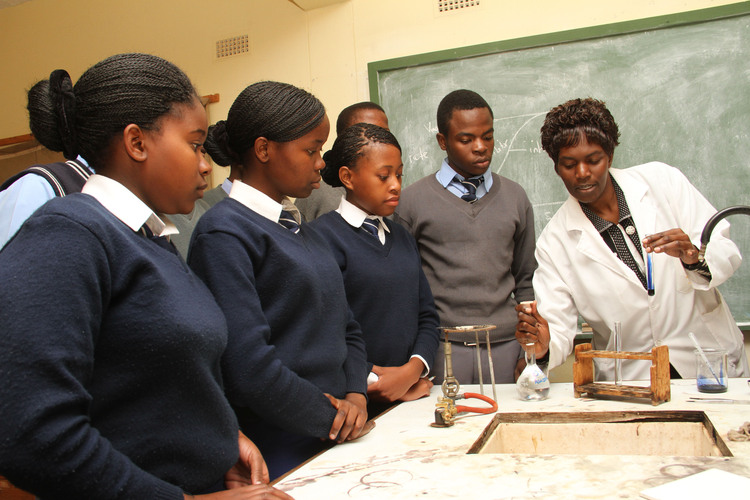
The Sunday Mail


Lab technician, Mrs Audrey Muzavazi (right) demonstrates an experiment to some of the Lower Six Science students at Waddilove High last Tuesday
Desire Ncube
SCHOOLS under the administration of Methodist Church in Zimbabwe have remained among the best ‘O’ and ‘A’ Levels performers due to the consistent standards of Christianity upheld by the church, authorities have said.
Pass rates at the church’s schools have been averaging around 95 percent for ‘A’ Level while ‘O’ level has been 85 percent.
Some of the Methodist Church in Zimbabwe schools which have consistently featured among the 50 best performers include Waddilove, Sandringham, Pakame and Moleli High.
Methodist Church in Zimbabwe has more than 40 primary and high schools dotted across the country.
The church has a policy to concentrate educational effort on the uplifting of indigenous Zimbabweans.
Methodist Church in Zimbabwe Education secretary, Reverend Eliot Mashonganyika said education and the church cannot be separated.
“In the early days, mission work was considered a totality. The school, whenever one was built at a station, could not be separated from the administration of the church.
“Many scholars have failed to resist the temptation of trying to discover where religion ends and education begins. The two are intertwined. So to trace the beginning of a church school the history must often unravel twisted strands of ecclesiastical events first,” he said.
“The church has upheld the high standards set by the early missionaries. The number of schools have increased and we are still rendering the same values.
“The Bible is unchangeable, it maintains its standard come what may, the same applies to our institution. A major contributing factor to the efficacious Christianisation of pupils at our schools is that many of our teachers are also Christians, some are not Methodist, but they are all delivering a Christian-oriented curriculum with Bible knowledge as a major component,” said Rev Mashonganyika.
He said that annually, the schools are evaluated and rated according to performance and this has helped in maintaining principals and moral values.
Waddilove High deputy headmistress, Mrs Lizzy Muvevi said the Christian environment they have created at their school has the power to transform students.
“Many pupils who came only for education have been led to Christ during their stay with us. We are preparing them to adapt well in the society. We are still emphasising on spiritual /religious matters at all our schools. And I am convinced that this is why we are doing so well,” said Mrs Muvevi.
“Our schools are producing students who are fitting well in every sector of the country. We have many of our students who are at the University of Zimbabwe studying medicine, law and engineering among other programmes. Others are flourishing at regional and international universities,” Mrs Muvevi added.
Waddilove High principal Rev Edmore Vhazhure said the learning environment contributes immensely to the students’ success in their endeavours.
“As a church we discovered that the environment contributes immensely to the success of pupils. As a result, we created a Christian environment basing on the philosophy of ‘ubuntu/hunhu’. Character building is really working for us,” Rev Vhazhure said.
The Methodist Church in Zimbabwe’s mission education was first heralded in Epworth.
From that base, Methodist’s influence spread in all directions to stations like the Ndebele King Lobengula’s former headquarters in Bulawayo, Gwaai, Gwanda, Hwange, Thekwane and Shurugwi. More church work was later done in Kadoma, Kwekwe and Gweru. It has since spread across the whole country.
The Methodist Church’s concern for the indigenous people was their conversion to Christianity.
However, literacy was required to ensure that the local people read the Bible.
This influenced the building of schools.
The earliest educational institutions then had their origins in the establishment of Sunday Schools.
“Gradually these expanded in scope to resemble the conventional type of schools.
‘‘Their curricula was initially dominated by reading, writing, spelling and scripture. With the passage of time, however, industrial subjects such as elementary agriculture and woodwork found their way into the learning programmes,” Rev Mashonganyika said.
The Methodist Church in Zimbabwe was however not the only denomination that had an interest in propagating education and Christianity across the country.
‘‘The United Methodist church, the Roman Catholics, the London Missionary Society, Anglicans, Lutherans, Seventh Day-Adventist and Salvation Army were doing similar work.
Rev Mashonganyika said this led to competition among the various denominations for membership.
“It soon became evident that those churches which catered for the material needs of their members attracted the most converts. Partly as a consequence of this realisation and out of a genuine desire to improve the quality of human life, the Methodist Church vastly expanded its involvement in those activities that promoted the material well-being, as opposed to spiritual needs only,” added Rev Mashonganyika.
The likes of Zambia’s first black president Kenneth Kaunda, Zimbabwe’s first black Chief Justice, Enoch Dumbutshena among many others, were educated at Waddilove High.



